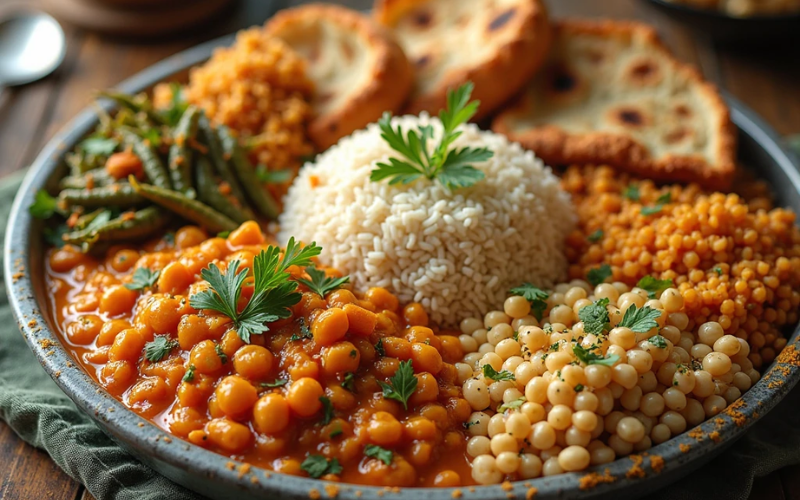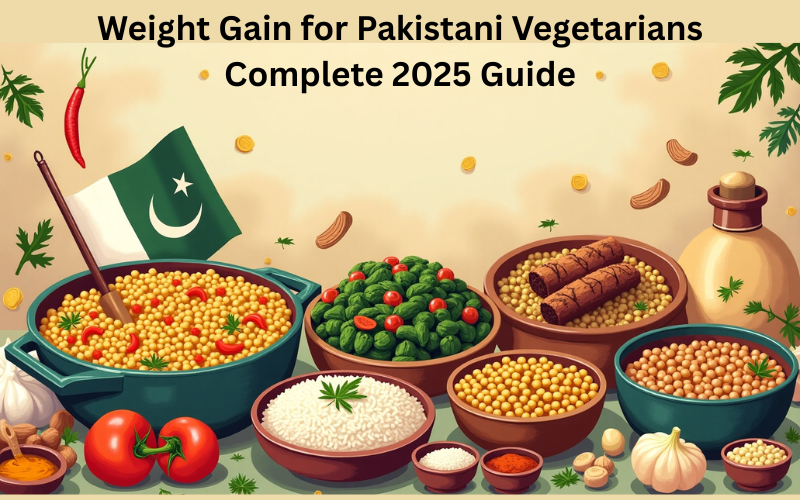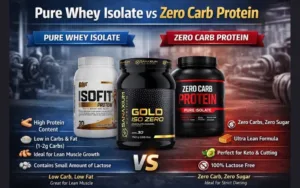No products in the cart.
Return To ShopWeight Gain for Pakistani Vegetarians: Complete 2025 Guide
Gaining healthy weight as a Pakistani vegetarian can feel challenging especially when most traditional meals are high in carbs but low in fats and protein. Whether you’re underweight, recovering from illness, or looking to build lean muscle, this guide will walk you through realistic, local, and affordable strategies for healthy weight gain.
Why Do Many Pakistani Vegetarians Struggle with Weight Gain?
Pakistani vegetarian diets often include chapati, rice, daal, and cooked vegetables which are great, but typically low in healthy fats and protein. Common reasons for weight gain challenges include:
- Low daily calorie intake
- Lack of calorie-dense protein foods
- Skipping meals
- Overreliance on carbs without enough fat or protein
- Lack of strength-based exercise
The key isn’t just to eat more, but to eat smarter, choosing nutrient-dense foods that support muscle growth, not just fat gain.
Understanding Healthy Weight Gain
Weight gain should ideally focus on building lean muscle, not just adding body fat. That means combining:
- Calorie surplus: Eating more than you burn
- Macronutrient balance: Protein + complex carbs + healthy fats
- Strength training: To convert those extra calories into muscle
Unhealthy methods (like junk food and sugary drinks) may cause bloating or fat gain but won’t improve your strength or health.
High-Calorie Vegetarian Foods Easily Available in Pakistan

Here are 11 vegetarian-friendly, calorie-dense foods that are either locally available or easy to substitute:
1. Nuts and Nut Butters
Peanuts, almonds, walnuts, and cashews are rich in calories, protein, and healthy fats. Peanut butter or almond butter on toast or roti is perfect for weight gain.
2. Avocado
If available, add it to smoothies, toasts, or parathas. Where not available, replace with bananas or full-fat dairy for a similar calorie boost.
3. Quinoa (or Local Substitute: Bajra, Daliya)
Quinoa is high in protein and carbs, but expensive. Use bajra, daliya, or brown rice as cost-effective, locally sourced options.
4. Tahini and Sesame Seeds (Till ke beej)
Add sesame paste or toasted till to rotis, salads, or yogurt for a healthy fat boost.
5. Olive Oil and Desi Ghee
Drizzle olive oil on cooked vegetables, or use desi ghee to cook daal, roti, or paratha. Great calorie boost without increasing food volume.
6. Dried Fruits (Khajoor, Kishmish, Anjeer)
Dates and raisins are affordable, high in calories, and can be added to shakes, porridge, or eaten as snacks.
7. Legumes (Daal, Rajma, Chana, Lobiya)
Great source of plant-based protein and carbs. Combine with rice or roti for a complete meal.
8. Sweet Potatoes (Shakarkandi)
Street-available and ideal for roasted snacks, curries, or mashed into rotis for calorie-dense meals.
9. Granola or Homemade Muesli
Make your own using oats, nuts, dates, and jaggery. Excellent for breakfast or snacking.
10. Dark Chocolate (Cocoa-rich options)
Enjoy in moderation as a post-meal dessert or blend in smoothies.
11. Coconut Products (Dry or Milk)
Use coconut milk in smoothies or stews; dry coconut in chutneys or snacks. Rich in calories and MCT fats.
Sample 1-Day Weight Gain Meal Plan for Pakistani Vegetarians
Here’s a practical vegetarian meal plan using local Pakistani ingredients:
| Meal | Food |
| Breakfast | Paratha with peanut butter + banana + chai |
| Snack | Date shake with almonds and milk |
| Lunch | Daal + chawal with desi ghee + cucumber salad |
| Snack | Roasted shakarkandi + a handful of raisins |
| Dinner | Rajma with roti + sauteed vegetables in olive oil |
| Pre-Bed | Warm milk with honey and sesame seeds |
Total: ~2500-2800 calories
Homemade Smoothie Recipes for Weight Gain
Use these high-calorie vegetarian smoothies with ingredients easily available in Pakistan:
Peanut Butter Banana Shake
- 1 banana
- 2 tbsp peanut butter
- 1 cup full-fat milk
- 1 tsp honey
- Ice cubes
→ ~450 calories
Date & Almond Shake
- 5 dates (khajoor)
- 10 soaked almonds
- 1 cup milk or coconut milk
→ ~400 calories
Mango Lassi (Weight Gain Version)
- 1 mango
- 1 cup yogurt
- 1 tbsp sugar or honey
→ ~350 calories
Do Vegetarians in Pakistan Need Supplements for Weight Gain?
Not always but you may consider these optional additions:
- Plant-based protein powder (if you’re doing gym or strength training)
- Vitamin B12 and Vitamin D3 (often deficient in desi vegetarian diets)
- Omega-3 (Algae Oil) if you’re not eating eggs or fish
Common Mistakes to Avoid
- Eating only carbs (roti, chawal) without protein or fat
- Skipping meals or long fasting periods
- Relying on soft drinks or chips to increase calories
- Not doing any form of resistance or weight training
Exercise for Healthy Weight Gain
Strength training is the best option. Focus on:
- Bodyweight exercises (pushups, squats)
- Resistance bands or dumbbells (if gym not available)
- Avoid long cardio sessions (they burn too many calories)
Aim for 3–4 workouts per week alongside your high-calorie diet.
FAQs – Weight Gain for Pakistani Vegetarians
Q1: Can vegetarians gain weight without supplements?
Yes! With calorie-dense foods like daal, rice, nuts, and ghee, you can gain weight naturally.
Q2: What if I don’t have access to avocado or quinoa?
No worries! Use shakarkandi, bananas, bajra, and oats — easily found and budget-friendly.
Q3: Is daal enough for building muscle?
Yes — when combined with roti or rice, it provides a complete amino acid profile.
Q4: What’s a good pre-bed meal for weight gain?
Warm milk with honey, dates, or a spoon of peanut butter is ideal.
Q5: How long does it take to gain weight healthily?
With consistent eating and training, expect 1–2 kg/month — the healthy way.
✅ Final Tips
- Aim to eat every 3–4 hours
- Add healthy fats to every meal
- Use homemade smoothies for extra calories
- Track your weight weekly (not daily)
📣 Want Help Gaining Weight the Right Way?
Explore vegetarian supplements, protein powders, and nutrition tips at
👉 Sportsone.com.pk – Pakistan’s trusted store for authentic, safe, and tested nutrition products.









Add comment